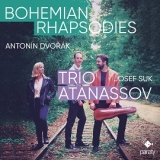Über die Werke, die das Atanassov Trio spielt, ist in musikalischer Hinsicht eigentlich bereits alles gesagt worden. Viele hervorragende Einspielungen zeugen von der großartigen Musik Dvoraks und Suks. Auch diese neue Einspielung ist hochkarätig. Trotz des Titels Bohemian Rhapsodies atmet sie nicht einfach nur böhmisches Flair. Gleich im ersten Satz des Opus 26 setzen die Musiker auf starke Kontraste. Auch das Largo wird bei den Atanassovs recht düster. Das anschließende Scherzo ist energisch drängend, mit dunklem rhythmischem Schwung, allerdings mit einem kantablen Trio. Das Finale hat viel Intensität. Die Stimmung ist unbeständig, aber der manchmal wehmütige Satz endet positiv. Bemerkenswert ist über das ganze Stück hinweg, dass das Spiel des Trio Atanassov bei aller Energie und Vitalität nie schroff wirkt.
Im Dumky-Trio gibt es Momente von stupender Schönheit, Tiefe und Virtuosität. Auch in dieser Komposition spüren die Atanassovs den Kontrasten der Musik nach, und sie bringen diesen Aspekt mit Raffinement und Leichtigkeit zum Ausdruck. Energie ist erneut kein Mittel zu scharfem, harten Musizieren.
Die Elegie von Josef Suk beschließt das Programm mit ruhiger Melancholie, aber ohne Sentimentalismus.
From a musical point of view everything has already been said about the works played by the Atanassov Trio. Many excellent recordings bear witness to the great music of Dvorak and Suk. This new recording is also top-notch. Despite the title Bohemian Rhapsodies, it does not simply breathe Bohemian flair. Right from the first movement of Opus 26, the musicians rely on strong contrasts. The Largo also becomes quite somber with the Atanassovs. The ensuing Scherzo is energetically urgent, with dark rhythmic momentum, though with a cantabile trio. The finale has plenty of intensity. The mood is volatile, but the sometimes wistful movement ends on a positive note. What is remarkable throughout the piece is that for all its energy and vitality, the playing of the Trio Atanassov never seems rough.
There are moments of stupendous beauty, depth and virtuosity in the Dumky Trio. In this composition, too, the Atanassovs trace the contrasts of the music, and they express this aspect with refinement and ease. Energy is again not a means to sharp, hard music-making.
Josef Suk’s Elegy concludes the program with quiet melancholy, but without sentimentalism.






















